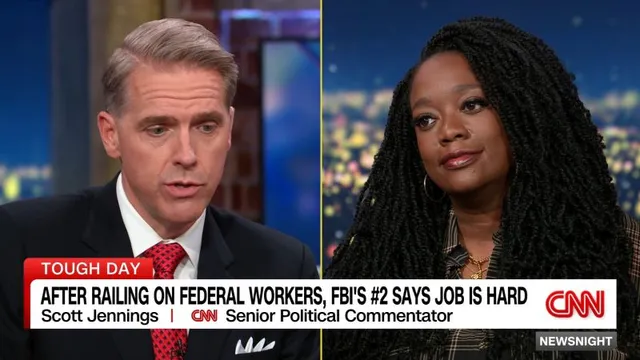
Dan Bongino admits he doesn't enjoy his tough FBI role
2025-05-30 22:44- Dan Bongino discussed the emotional and personal toll of his role as deputy director of the FBI.
- His comments drew criticism from Ashley Allison, who noted that many in the agency face similar hardships without complaint.
- The conversation highlights a significant gap in understanding the sacrifices of public servants compared to their criticisms of them.
Express your sentiment!
Insights
In a recent interview, Dan Bongino, the deputy director of the FBI, openly shared his feelings about the pressures and challenges of his job within the agency located in Washington, D.C. He disclosed that he often works long hours, starting at 7:30 a.m., and feels emotionally strained due to the demands of his position. Bongino's comments come amidst scrutiny from both political opponents and supporters regarding his leadership and responsibilities at the FBI. His remarks particularly highlighted how the job affects his personal life, as he described being separated from his wife, which adds to the strain he feels. Bongino's public expressions of hardship elicited a mixed response, particularly from former Biden-Harris adviser Ashley Allison, who criticized his complaints as lacking sympathy. She pointed out that many individuals in the FBI and government face similar burdens and sacrifices without the same level of public platform to vent their frustrations. This response suggests a broader political conversation about the understanding of sacrifice among government officials compared to everyday citizens. The context is essential, as it frames Bongino's challenges within the larger scope of public service and the sacrifices made by various workers, including FBI agents who frequently miss family events and deal with rigorous job demands. The disconnect between political figures who acknowledge their challenges and those who endure similar issues without recognition underscores a societal dialogue around the nature of sacrifice, work-related stress, and the impact of public service on personal lives. In making his statements, Bongino seemingly aimed to humanize the challenges faced within the FBI, hinting at a need for understanding and appreciation of these sacrifices. His emotional expression on national television raised questions about the expectations placed on high-ranking officials and the acknowledgment of their struggles. Ultimately, Bongino's narrative dispels any illusions of ease associated with the role of deputy director, highlighting instead the intense pressures that accompany high-level law enforcement responsibilities.
Contexts
The pressures of working at the FBI encompass a wide range of challenges that employees face in their day-to-day operations. As one of the leading federal law enforcement agencies, the FBI is tasked with addressing national security threats and enforcing federal laws. This responsibility often leaves agents and personnel in high-stress situations where they must think critically and act quickly. The stakes are particularly high when dealing with matters of national security, as the consequences of errors can be severe, potentially affecting the safety of countless individuals. The intense scrutiny from the public and media also adds to the pressure, forcing agents to maintain a high level of professionalism while performing their duties. Moreover, the unique nature of FBI work, including investigations into complex criminal activities and counterterrorism efforts, requires agents to sustain long hours and an unpredictable schedule. The combination of demanding work hours and the emotional toll of confronting law-breaking activities leads to significant burnout among employees. This is exacerbated by the perpetual need to stay updated on the latest developments in technology, criminal methods, and legal standards, which can create additional stress for agents striving to perform at their best in an ever-evolving environment. Additionally, the culture within the FBI can contribute to the pressures experienced by its workforce. There exists a strong emphasis on results and performance metrics, which can be a double-edged sword. While this focus aims to ensure that the agency maintains high standards and achieves its objectives, it may also result in an unhealthy work-life balance for employees. Many agents may feel compelled to compromise their personal lives in search of career advancement or acknowledgment of their hard work. This environment can lead to feelings of isolation and a decreased sense of job satisfaction, particularly for those who struggle to cope with the emotional impact of their daily experiences. In conclusion, the pressures of working at the FBI are multifaceted, stemming from the agency's significant responsibilities, high expectations, and the demands of the job itself. It is crucial to acknowledge both the rewards and challenges that come with such a high-stakes career. Addressing these pressures through organizational support, mental health resources, and fostering a healthy work-life balance is essential for sustaining an effective workforce. The well-being of FBI employees is not just a personal concern; it is imperative for the agency's overall mission and effectiveness in safeguarding national security.